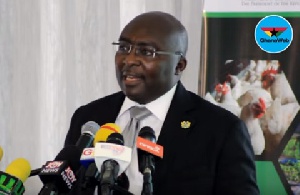The minority in parliament has said Vice-President Dr Mahamudu Bawumia’s recent attacks on former President John Mahama betrayed his unpresidential temperament which is unfit for his office.
Former deputy finance minister Cassiel Ato Forson, who addressed journalists at a press conference on Wednesday in connection with the failed GHS6billion energy bond said: “This monumental failure is a classic vote of no confidence in the economy and the economic management team led by the Vice-President of the Republic.”
“I hope that after saying this, the Vice-President, who is known for attacking people does not attack my person. He is occupying the office of the Vice-President so I will plead with him to watch his temperament. His temperament does not befit the office of a Vice-President”, Mr Ato Forson added.
According to the minority, the failure by government to achieve its target of GHS6 billion for the recently issued 10-year and 7-year energy bond is proof that investors have lost confidence in Ghana’s economy.
The amount raised for the paper fell short of GHS1.4 billion at an interest rate of 19.5 percent.
Addressing a press conference on Wednesday, 8 November, the ranking member of the Finance Committee said: “The poor showing of the bond is a vote of no confidence in the Akufo-Addo and Bawumia-led government by the investor community”.
Mr Forson was of the view that when the shortcomings of government are exposed by the minority, Vice-President Dr Mahamudu Bawumia, who doubles as the head of the economic management team rather “runs away from the fact to say: ‘You don’t read’”.
The lawmaker taunted: “The world’s number one reader cannot raise a bond which anybody can do; it is interesting. Ghana’s number one reader cannot even raise a GHS6 billion bond yet he brought something that has put Ghana to shame”.
Mr Forson questioned why parliamentary approval was not sought before the issuance of the bonds and accused government of causing financial loss.
For him, the absence of parliamentary approval turned investors off since, according to him, most offshore investors who are big buyers of Ghana’s bond would only participate in papers that are guaranteed by the government.
Also, he said: “The projected consumption [of fuel] was grossly overstated and overestimated and any analyst in this world who understands the Ghanaian economy will find the assumption [on which the bonds were being raised] very unrealistic, untruthful and may not have any interest in the bond. It is, therefore, not surprising that the participation rate of the investor was very low.”
He pointed out that the “inability by government to meet the debt service coverage ratio” is one of the major reasons for the failure, adding: “Before raising bonds, government needed to communicate to the investors that the proceeds will be able to service the bond going forward. Unfortunately, the assumption that was provided by the ministry of finance to the investors were clearly short of the truth”.
General News of Wednesday, 8 November 2017
Source: classfmonline.com













